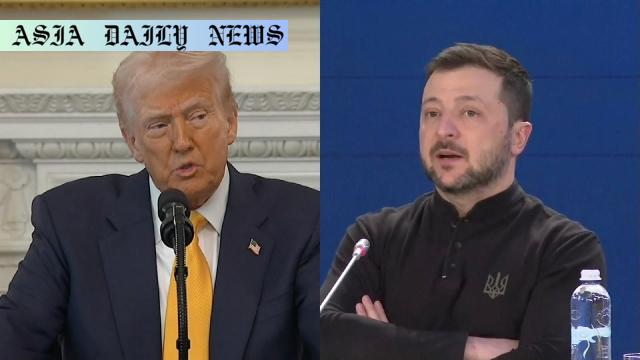Zelenskyy: Ukrainian President’s visit to the US on Friday could mark a milestone in securing a minerals agreement with Trump.

Zelenskyy’s Highly Anticipated US Visit
On Friday, Ukrainian President Volodymyr Zelenskyy is expected to visit the United States. This visit comes amidst ongoing discussions between Ukraine and the U.S., focused on finalizing a minerals agreement—an issue that has attracted significant global attention. U.S. President Donald Trump recently disclosed Zelenskyy’s planned visit in response to media inquiries, hinting at a potential signing ceremony for the deal.
This visit holds outsized importance not only for the strategic partnership between the two countries but also for the broader geopolitical ramifications. The minerals deal reportedly aims to secure U.S. access to Ukraine’s lucrative mineral resources. In exchange, the United States would continue its support for Ukraine at a critical juncture in their defense against Russia.
The Minerals Deal and its Complexities
The Financial Times and other outlets have reported that the U.S. and Ukraine have largely agreed on the terms of the minerals agreement. However, there is still much ambiguity surrounding whether the final agreement will encompass the explicit security guarantees that Ukraine has persistently sought from the U.S. to safeguard its sovereignty and protect against further Russian aggression.
Earlier this month, Treasury Secretary Scott Bessent was sent to Kyiv to facilitate the negotiations. While the talks advanced, they failed to finalize the agreement, reportedly frustrating Trump. The U.S. President expressed dissatisfaction with the delay, even referring to Zelenskyy as a “dictator” in his remarks, signaling tensions that might affect bilateral negotiations.
Strategic Implications of US-Ukraine Relations
Trump’s initiative to secure mineral rights from Ukraine highlights a new dimension to U.S.-Ukraine cooperation, yet it also underscores transactional aspects of international politics. For Ukraine, relying on American support is essential for their continued resistance against Russian aggressions, but tying this support to mineral deals might present a precarious precedent.
The deal’s potential impacts aren’t limited to economic or defense matters; they could redefine how the U.S. engages diplomatically with allies around the globe. Additionally, the impending ceasefire talks in Ukraine rely heavily on outside actors like the U.S., adding another layer of importance to the outcome of this agreement.
Looking Forward: Key Questions
As observers keenly await Zelenskyy’s visit, critical questions remain unanswered. Will the minerals agreement signal a shift toward more transactional foreign policy approaches by the United States? Will it include the security assurances that Ukraine strongly desires, and how might this impact their trust in the U.S. as a reliable ally? Furthermore, can this agreement and strengthened ties between the U.S. and Ukraine pave the way for successful ceasefire negotiations?
All these questions emphasize the significance and complexities of Zelenskyy’s visit to the U.S. on Friday. It’s a pivotal moment, rich with both opportunities for progress and the risk of deepening divides.
Commentary
Complex Interplay of Resources and Geopolitics
Zelenskyy’s upcoming visit to the United States on Friday highlights just how intertwined economics and geopolitics can be in today’s world. The potential minerals deal under discussion is emblematic of a larger reality where nations seek to balance strategic needs with pragmatic resource interests.
For President Trump, securing access to Ukraine’s mineral resources likely represents both a strategic boon and a domestic talking point. Ukraine’s vast mineral wealth is critical to industries ranging from electronics to defense, and controlling a share of that market could enhance U.S. competitiveness and security. However, tying such a deal directly to military and financial assistance creates a perception of conditional support—something that could alienate Ukraine even as it continues to rely heavily on U.S. backing.
The Burden on Ukraine
From Ukraine’s perspective, this deal places Zelenskyy in a challenging position. He’s tasked with navigating a diplomatic tightrope—securing essential U.S. support while avoiding deals that may compromise Ukraine’s long-term autonomy or economic stability. To complicate matters, the absence of clear security guarantees within the agreement would leave Ukraine vulnerable, eroding trust between the two nations.
At its heart, this visit reflects the larger challenges Ukraine faces. As a nation caught in the crossfire of a proxy conflict between major powers, every diplomatic decision carries outsized consequences. It’s a sobering reminder of how global politics can force smaller nations into constrained positions.
Looking Ahead
Zelenskyy’s visit has the potential to reset U.S.-Ukraine relations and initiate stronger cooperation—provided both nations approach their negotiations with mutual respect and transparency. However, both leaders must recognize the stakes beyond immediate material gains. They hold an opportunity to demonstrate that alliances can remain principled even in trying times. Outcomes from this meeting could well shape not just bilateral relations, but broader global perceptions regarding the U.S. role as a fair arbiter in international affairs.


